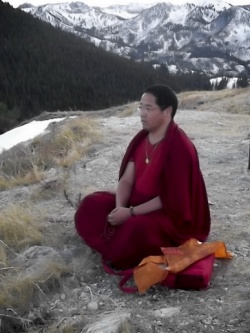Kama (Nyingma)
Click here to see other articles relating to word Kama (Nyingma)
- See also :
- See also :
The Nyingma Kama (Tib. རྙིང་མ་བཀའ་མ་, Wyl. rnying ma bka' ma), the Oral Transmission Lineage of the Nyingma, together with the Terma lineage, are the two modes of transmission of the Sutrayana and Vajrayana teachings of the Nyingma School.
The Nyingma Kama is a collection of empowerments and instructions for the kama, or oral transmission lineage, which is one of two unique streams of teachings in the Nyingma school of Tibetan Buddhism.
It includes Indian root texts and commentaries that were translated into Tibetan during the initial spread of Buddhism in Tibet, and then handed down orally in a continuous stream up to the present day.
The Nyingma Kama also includes centuries of Tibetan commentaries and instructions based on the Indian tradition.
The kama teachings are the counterpart of the terma teachings.
Termas are concealed instructions and practices discovered from the 11th century onwards by reincarnations of Padmasambhava’s closest disciples.
The function of terma is to revitalize the essence of the kama at times when the dharma is waning or threatened.
The heart of the terma tradition is presented through the Rinchen Terdzö,
The Nyingma Kama and Rinchen Terdzö are the two essential transmissions a Nyingma lineage.
Nyingma Kama, a collection of the oral teachings and practices brought to Tibet by Guru Padmasambhava and other great Vajra Masters during the Early Translation Period, taught to the Twenty-Five Disciples and passed down from teacher to student to the present day.
The Nyingma Kama is a collection of empowerments and instructions for the kama, or oral transmission lineage, one of two unique streams of teachings in the Nyingma school of Tibetan Buddhism.
It includes Indian root texts and commentaries that were translated into Tibetan during the initial spread of Buddhism in Tibet, and then handed down orally in a continuous stream up to the present day.
The Nyingma Kama also includes centuries of Tibetan commentaries and instructions based on the Indian tradition.
The teachings in the Nyingma Kama cover all levels of practice, but primarily present the highest tantric traditions of maha, anu, and ati yogas, which are the specialties of the Nyingma lineage.
Authors in the Nyingma Kama include such great masters as Garab Dorje, Padmasambhava, Vimalamitra, Vairocana, Rongzompa, Longchenpa, and Jigme Lingpa.
One of the most important editions of the Nyingma Kama was edited and expanded by Jigdral Yeshe Dorje, the 2nd Dudjom Rinpoche (1904-1988). The kama teachings are the counterpart of the terma teachings.
Termas are concealed instructions and practices discovered from the 11th century onwards by reincarnations of Padmasambhava's closest disciples.
The function of terma is to revitalize the essence of the kama at times when the dharma is waning or threatened. The heart of the terma tradition is presented through the Rinchen Terdzo,
Sogyal Rinpoche writes:
- "The Kama, or canonical teachings, have been transmitted in an unbroken lineage from the primordial Buddha Samantabhadra down to the present day.
Earlier on they were maintained in Tibet by Padmasambhava’s disciples Nyak Jñanakumara and Nupchen Sangyé Yeshé, and later (from the eleventh century onwards) by the masters of the Zur family.
There developed two Kama lineages in Tibet, the Rong lineage of Central Tibet and the Kham lineage of Eastern Tibet, which were brought together by Terdak Lingpa (1646–1714) in the late seventeenth century.
The Kama teachings collected by Terdak Lingpa and his brother Lochen Dharmashri (1654–1717/8) were later expanded in the monasteries of Dzogchen and Palyul, and finally published in forty volumes by Kyabjé Dudjom Rinpoche."
